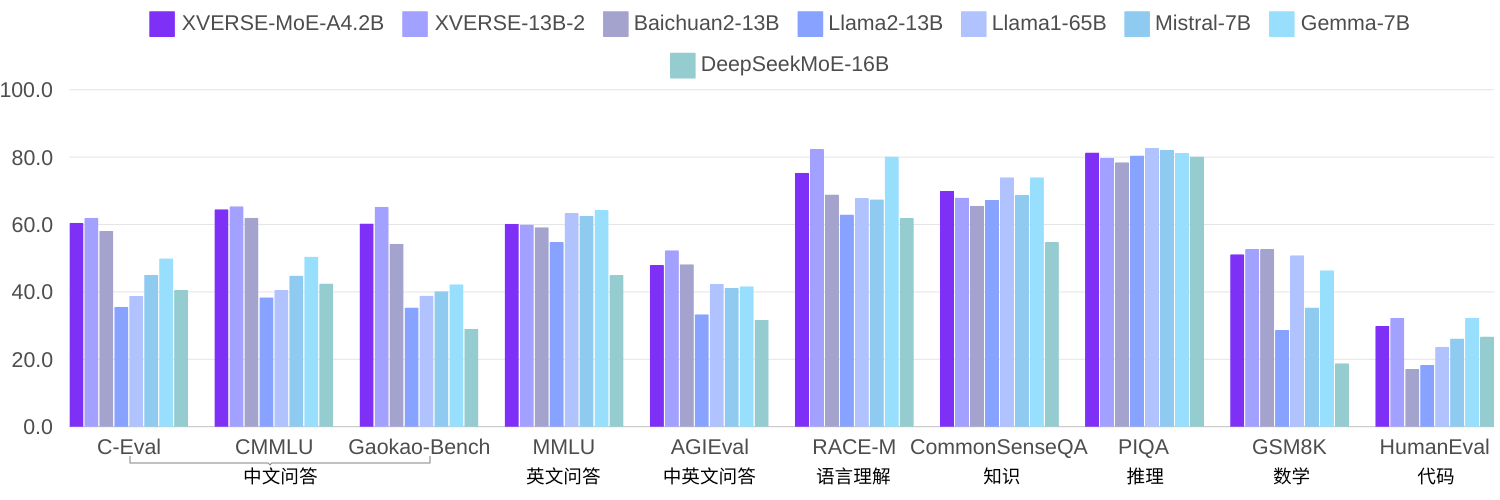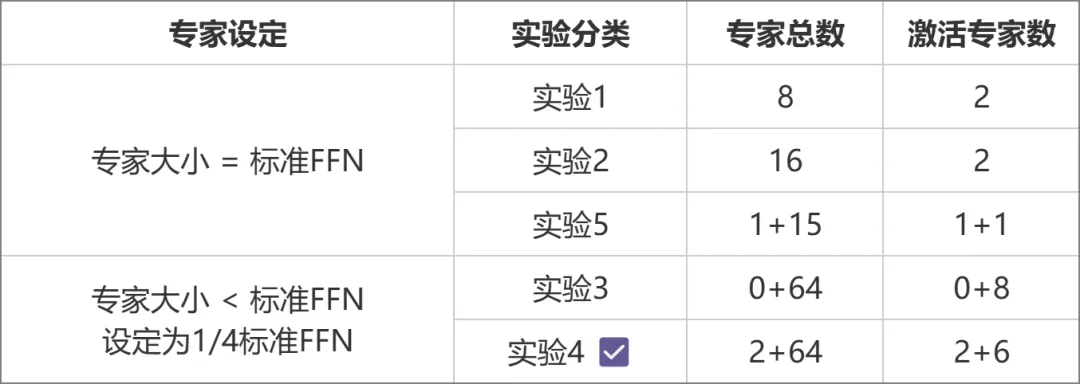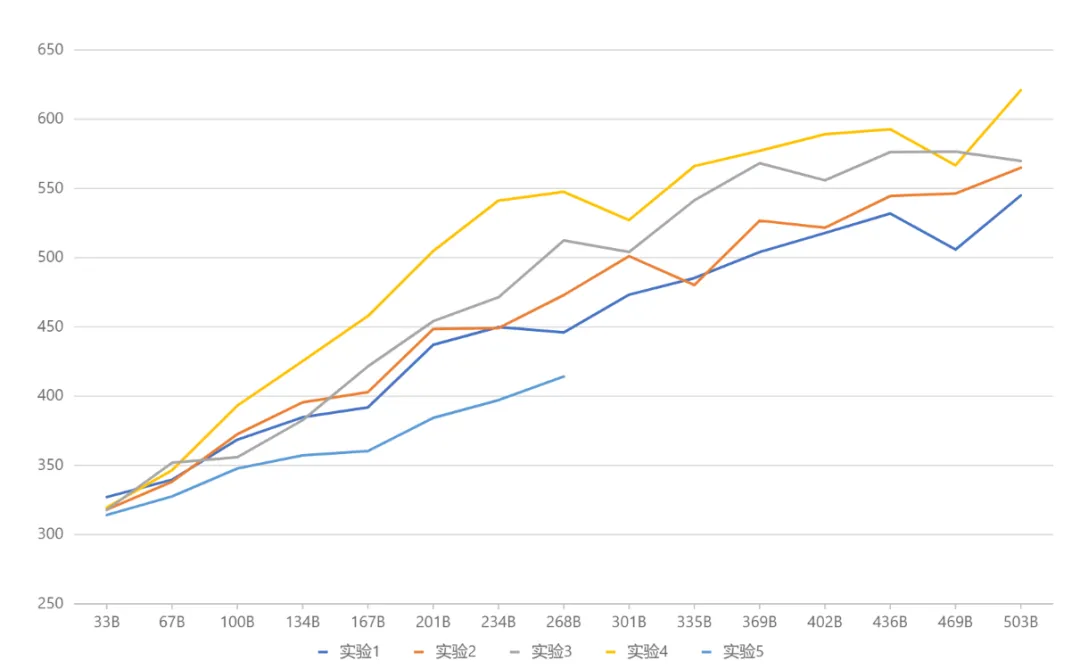 Technology peripherals
Technology peripherals
 AI
AI
 Yuanxiang's first MoE large model is open source: 4.2B activation parameters, the effect is comparable to the 13B model
Yuanxiang's first MoE large model is open source: 4.2B activation parameters, the effect is comparable to the 13B model
Yuanxiang's first MoE large model is open source: 4.2B activation parameters, the effect is comparable to the 13B model
Yuanxiang released the XVERSE-MoE-A4.2B large model, which adopts the industry's most cutting-edge mixed expert model architecture (Mixture of Experts) and activates parameter 4.2B, and the effect is comparable to the 13B model. This model is fully open source and unconditionally free for commercial use, allowing a large number of small and medium-sized enterprises, researchers and developers to use it on demand in Yuanxiang's high-performance "family bucket", promoting low-cost deployment.

The development of mainstream large models such as GPT3, Llama and XVERSE follows the Scaling Law. In the process of model training and inference, a single forward and reverse calculation When, all parameters are activated, which is called Dense activation (densely activated). When the model scale increases, the computing power cost will increase sharply.
As more and more researchers believe that the sparsely activated MoE model can be more effective without significantly increasing the computational cost of training and inference when increasing the model size. Methods. Because the technology is relatively new, most open source models or academic research in China are not yet popular.
In the element self-research, using the same corpus to train 2.7 quadrillion tokens, XVERSE-MoE-A4.2B actually activated 4.2B parameters, and the performance "jumped" beyond XVERSE-13B-2, only the amount of calculation , and reduce training time by 50%. Compared with multiple open source benchmarks Llama, this model significantly surpasses Llama2-13B and is close to Llama1-65B (picture below).

View multiple authoritative reviews
In terms of open source, the element large model "Family Bucket" continues to iterate, leading domestic open source to the world's first-class level. In terms of application, Element leverages the unique advantages of AI 3D technology and launches one-stop solutions such as large model 3D space and AIGC tools, empowering various industries such as entertainment, tourism, and finance, and provides intelligent customer service, creative experience, efficiency improvement tools, etc. Create a leading user experience in multiple scenarios.
MoETechnological self-research and innovation
The Ministry of Education (MoE) is the most cutting-edge model framework in the industry. Due to the relatively new technology, domestic Open source models or academic research are not yet widespread. MetaObject independently developed MoE's efficient training and inference framework, and innovated in three directions:
In terms of performance, a set of efficient fusion operators were developed based on the unique expert routing and weight calculation logic in the MoE architecture, which significantly This significantly improves computing efficiency; in view of the challenges of high memory usage and large communication volume in the MoE model, overlapping operations of computing, communication and memory offloading are designed to effectively improve the overall processing throughput.
In terms of architecture, unlike traditional MoE (such as Mixtral 8x7B), which equates the size of each expert to the standard FFN, Yuanxiang adopts a more fine-grained expert design, and the size of each expert is only one-quarter of the standard FFN. First, it improves model flexibility and performance; it also divides experts into two categories: Shared Experts and Non-shared Experts. Shared experts remain active during calculations, while non-shared experts are selectively activated as needed. This design is conducive to compressing general knowledge into shared expert parameters and reducing knowledge redundancy among non-shared expert parameters.
In terms of training, inspired by Switch Transformers, ST-MoE and DeepSeekMoE, Yuanxiang introduces the load balancing loss term to better balance the load among experts; the router z-loss term is used to ensure efficient and stable training.
The architecture selection was obtained through a series of comparative experiments (picture below). In Experiment 3 and Experiment 2, the total parameter amount and activation parameter amount were the same, but the fine-grained expert design of the former brought higher performance Performance. On this basis, Experiment 4 further divided experts into two types: shared and non-shared, which significantly improved the effect. Experiment 5 explores the method of introducing shared experts when the expert size is equal to the standard FFN, but the effect is not ideal.

Comparing the experimental design plan
Comprehensive test results (picture below), Yuanxiang finally adopted the architecture settings corresponding to Experiment 4. Looking to the future, the newly open sourced projects such as Google Gemma and

Compare experimental results
Free download of large model
- Hugging Face: https://huggingface.co/xverse/ XVERSE-MoE-A4.2B
- ModelScope:https://modelscope.cn/models/xverse/XVERSE-MoE-A4.2B
- Github:https://github. com/xverse-ai/XVERSE-MoE-A4.2B
- For inquiries please send: opensource@xverse.cn
The above is the detailed content of Yuanxiang's first MoE large model is open source: 4.2B activation parameters, the effect is comparable to the 13B model. For more information, please follow other related articles on the PHP Chinese website!

Hot AI Tools

Undresser.AI Undress
AI-powered app for creating realistic nude photos

AI Clothes Remover
Online AI tool for removing clothes from photos.

Undress AI Tool
Undress images for free

Clothoff.io
AI clothes remover

AI Hentai Generator
Generate AI Hentai for free.

Hot Article

Hot Tools

Notepad++7.3.1
Easy-to-use and free code editor

SublimeText3 Chinese version
Chinese version, very easy to use

Zend Studio 13.0.1
Powerful PHP integrated development environment

Dreamweaver CS6
Visual web development tools

SublimeText3 Mac version
God-level code editing software (SublimeText3)

Hot Topics
 1382
1382
 52
52
 DeepMind robot plays table tennis, and its forehand and backhand slip into the air, completely defeating human beginners
Aug 09, 2024 pm 04:01 PM
DeepMind robot plays table tennis, and its forehand and backhand slip into the air, completely defeating human beginners
Aug 09, 2024 pm 04:01 PM
But maybe he can’t defeat the old man in the park? The Paris Olympic Games are in full swing, and table tennis has attracted much attention. At the same time, robots have also made new breakthroughs in playing table tennis. Just now, DeepMind proposed the first learning robot agent that can reach the level of human amateur players in competitive table tennis. Paper address: https://arxiv.org/pdf/2408.03906 How good is the DeepMind robot at playing table tennis? Probably on par with human amateur players: both forehand and backhand: the opponent uses a variety of playing styles, and the robot can also withstand: receiving serves with different spins: However, the intensity of the game does not seem to be as intense as the old man in the park. For robots, table tennis
 The first mechanical claw! Yuanluobao appeared at the 2024 World Robot Conference and released the first chess robot that can enter the home
Aug 21, 2024 pm 07:33 PM
The first mechanical claw! Yuanluobao appeared at the 2024 World Robot Conference and released the first chess robot that can enter the home
Aug 21, 2024 pm 07:33 PM
On August 21, the 2024 World Robot Conference was grandly held in Beijing. SenseTime's home robot brand "Yuanluobot SenseRobot" has unveiled its entire family of products, and recently released the Yuanluobot AI chess-playing robot - Chess Professional Edition (hereinafter referred to as "Yuanluobot SenseRobot"), becoming the world's first A chess robot for the home. As the third chess-playing robot product of Yuanluobo, the new Guoxiang robot has undergone a large number of special technical upgrades and innovations in AI and engineering machinery. For the first time, it has realized the ability to pick up three-dimensional chess pieces through mechanical claws on a home robot, and perform human-machine Functions such as chess playing, everyone playing chess, notation review, etc.
 Claude has become lazy too! Netizen: Learn to give yourself a holiday
Sep 02, 2024 pm 01:56 PM
Claude has become lazy too! Netizen: Learn to give yourself a holiday
Sep 02, 2024 pm 01:56 PM
The start of school is about to begin, and it’s not just the students who are about to start the new semester who should take care of themselves, but also the large AI models. Some time ago, Reddit was filled with netizens complaining that Claude was getting lazy. "Its level has dropped a lot, it often pauses, and even the output becomes very short. In the first week of release, it could translate a full 4-page document at once, but now it can't even output half a page!" https:// www.reddit.com/r/ClaudeAI/comments/1by8rw8/something_just_feels_wrong_with_claude_in_the/ in a post titled "Totally disappointed with Claude", full of
 At the World Robot Conference, this domestic robot carrying 'the hope of future elderly care' was surrounded
Aug 22, 2024 pm 10:35 PM
At the World Robot Conference, this domestic robot carrying 'the hope of future elderly care' was surrounded
Aug 22, 2024 pm 10:35 PM
At the World Robot Conference being held in Beijing, the display of humanoid robots has become the absolute focus of the scene. At the Stardust Intelligent booth, the AI robot assistant S1 performed three major performances of dulcimer, martial arts, and calligraphy in one exhibition area, capable of both literary and martial arts. , attracted a large number of professional audiences and media. The elegant playing on the elastic strings allows the S1 to demonstrate fine operation and absolute control with speed, strength and precision. CCTV News conducted a special report on the imitation learning and intelligent control behind "Calligraphy". Company founder Lai Jie explained that behind the silky movements, the hardware side pursues the best force control and the most human-like body indicators (speed, load) etc.), but on the AI side, the real movement data of people is collected, allowing the robot to become stronger when it encounters a strong situation and learn to evolve quickly. And agile
 ACL 2024 Awards Announced: One of the Best Papers on Oracle Deciphering by HuaTech, GloVe Time Test Award
Aug 15, 2024 pm 04:37 PM
ACL 2024 Awards Announced: One of the Best Papers on Oracle Deciphering by HuaTech, GloVe Time Test Award
Aug 15, 2024 pm 04:37 PM
At this ACL conference, contributors have gained a lot. The six-day ACL2024 is being held in Bangkok, Thailand. ACL is the top international conference in the field of computational linguistics and natural language processing. It is organized by the International Association for Computational Linguistics and is held annually. ACL has always ranked first in academic influence in the field of NLP, and it is also a CCF-A recommended conference. This year's ACL conference is the 62nd and has received more than 400 cutting-edge works in the field of NLP. Yesterday afternoon, the conference announced the best paper and other awards. This time, there are 7 Best Paper Awards (two unpublished), 1 Best Theme Paper Award, and 35 Outstanding Paper Awards. The conference also awarded 3 Resource Paper Awards (ResourceAward) and Social Impact Award (
 Hongmeng Smart Travel S9 and full-scenario new product launch conference, a number of blockbuster new products were released together
Aug 08, 2024 am 07:02 AM
Hongmeng Smart Travel S9 and full-scenario new product launch conference, a number of blockbuster new products were released together
Aug 08, 2024 am 07:02 AM
This afternoon, Hongmeng Zhixing officially welcomed new brands and new cars. On August 6, Huawei held the Hongmeng Smart Xingxing S9 and Huawei full-scenario new product launch conference, bringing the panoramic smart flagship sedan Xiangjie S9, the new M7Pro and Huawei novaFlip, MatePad Pro 12.2 inches, the new MatePad Air, Huawei Bisheng With many new all-scenario smart products including the laser printer X1 series, FreeBuds6i, WATCHFIT3 and smart screen S5Pro, from smart travel, smart office to smart wear, Huawei continues to build a full-scenario smart ecosystem to bring consumers a smart experience of the Internet of Everything. Hongmeng Zhixing: In-depth empowerment to promote the upgrading of the smart car industry Huawei joins hands with Chinese automotive industry partners to provide
 Li Feifei's team proposed ReKep to give robots spatial intelligence and integrate GPT-4o
Sep 03, 2024 pm 05:18 PM
Li Feifei's team proposed ReKep to give robots spatial intelligence and integrate GPT-4o
Sep 03, 2024 pm 05:18 PM
Deep integration of vision and robot learning. When two robot hands work together smoothly to fold clothes, pour tea, and pack shoes, coupled with the 1X humanoid robot NEO that has been making headlines recently, you may have a feeling: we seem to be entering the age of robots. In fact, these silky movements are the product of advanced robotic technology + exquisite frame design + multi-modal large models. We know that useful robots often require complex and exquisite interactions with the environment, and the environment can be represented as constraints in the spatial and temporal domains. For example, if you want a robot to pour tea, the robot first needs to grasp the handle of the teapot and keep it upright without spilling the tea, then move it smoothly until the mouth of the pot is aligned with the mouth of the cup, and then tilt the teapot at a certain angle. . this
 Distributed Artificial Intelligence Conference DAI 2024 Call for Papers: Agent Day, Richard Sutton, the father of reinforcement learning, will attend! Yan Shuicheng, Sergey Levine and DeepMind scientists will give keynote speeches
Aug 22, 2024 pm 08:02 PM
Distributed Artificial Intelligence Conference DAI 2024 Call for Papers: Agent Day, Richard Sutton, the father of reinforcement learning, will attend! Yan Shuicheng, Sergey Levine and DeepMind scientists will give keynote speeches
Aug 22, 2024 pm 08:02 PM
Conference Introduction With the rapid development of science and technology, artificial intelligence has become an important force in promoting social progress. In this era, we are fortunate to witness and participate in the innovation and application of Distributed Artificial Intelligence (DAI). Distributed artificial intelligence is an important branch of the field of artificial intelligence, which has attracted more and more attention in recent years. Agents based on large language models (LLM) have suddenly emerged. By combining the powerful language understanding and generation capabilities of large models, they have shown great potential in natural language interaction, knowledge reasoning, task planning, etc. AIAgent is taking over the big language model and has become a hot topic in the current AI circle. Au



